DUBAI: As online learning gathers pace to become the new norm for millions of students worldwide due to the coronavirus pandemic, regional foundations are lending a helping hand to refugees who may not have the privilege of online access.
Educational experts say it is crucial that organizations find ways to support refugee students at this time.
“One of the biggest challenges to helping vulnerable students in this crisis has been the lack of alternatives to online learning,” said Natasha Ridge, executive director at the Shaikh Saud bin Saqr Al-Qasimi Foundation for Policy Research in Ras Al-Khaimah, the UAE.
The challenge is especially big when one considers the fact that “refugees and students worldwide who are disadvantaged often don’t have access to devices or the internet,” she told Arab News.
“There are other options such as project-based learning, using the materials that students have around them, no matter how basic, that could offer cost-effective, low-tech solutions for independent learning when in-class lessons can’t take place,” Ridge said.
“But while online learning is important for refugee children, it isn’t necessarily the only answer. Distance education has been taking place across the world for decades.”
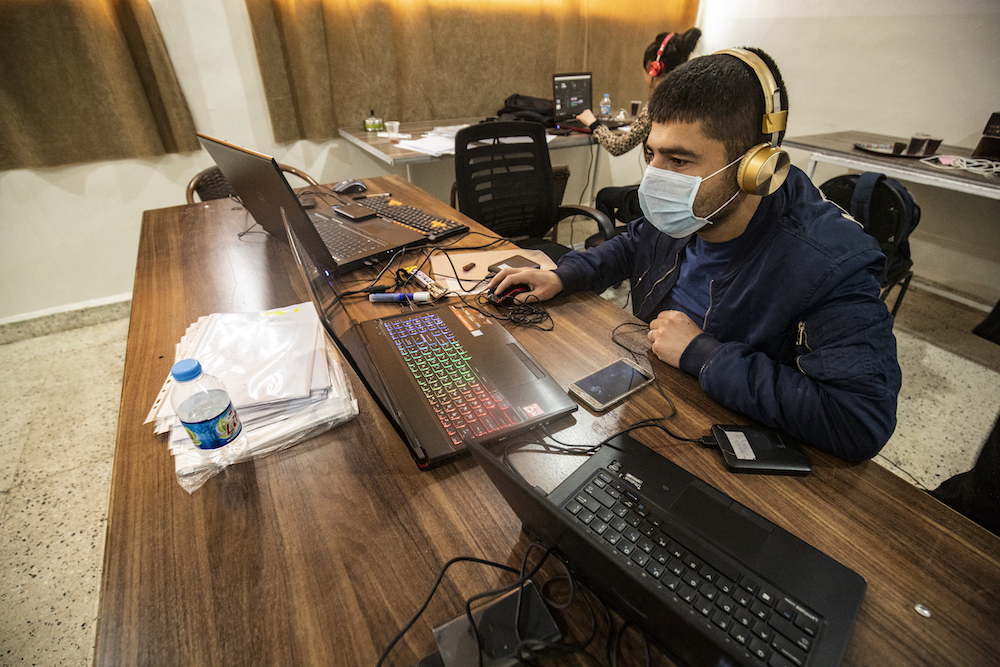
Technicians from the Kurdish educational authorities, prepare recorded classes to be broadcast on local television and Youtube for distance learning, in Qamishli, Syria's northeastern Hasakeh province. (AFP/File Photo)
Judith Finnemore, an education consultant in the UAE, expressed similar sentiments, noting that education is the only route out of continued poverty for refugee children.
“Refugee populations include many children whose families have been stateless and homeless for a number of generations, such as Palestinians, and now an alarming number of Syrians and other nationalities are losing their homes,” Finnemore told Arab News.
“When you’re a child your home is your roots, and it isn’t their fault that they don’t have roots,” she said.
“School can be the only stable thing in their life and, in the current situation, providing a way for them to continue their education is vital.”
FASTFACT
Jordan and Lebanon are among the top 10 hosts of refugees globally — UNHCR
She cited the example of Tendai, one of her former Ugandan students and a refugee who was accepted at Oxford University.
“He was shocked. He didn’t think such a prestigious institution would accept him. The day he graduated, he thanked me for encouraging him to raise his aspirations at school,” Finnemore said.
“Today, Tendai is an investment banker and a very successful one. We must do everything we can to encourage such children, particularly now.”
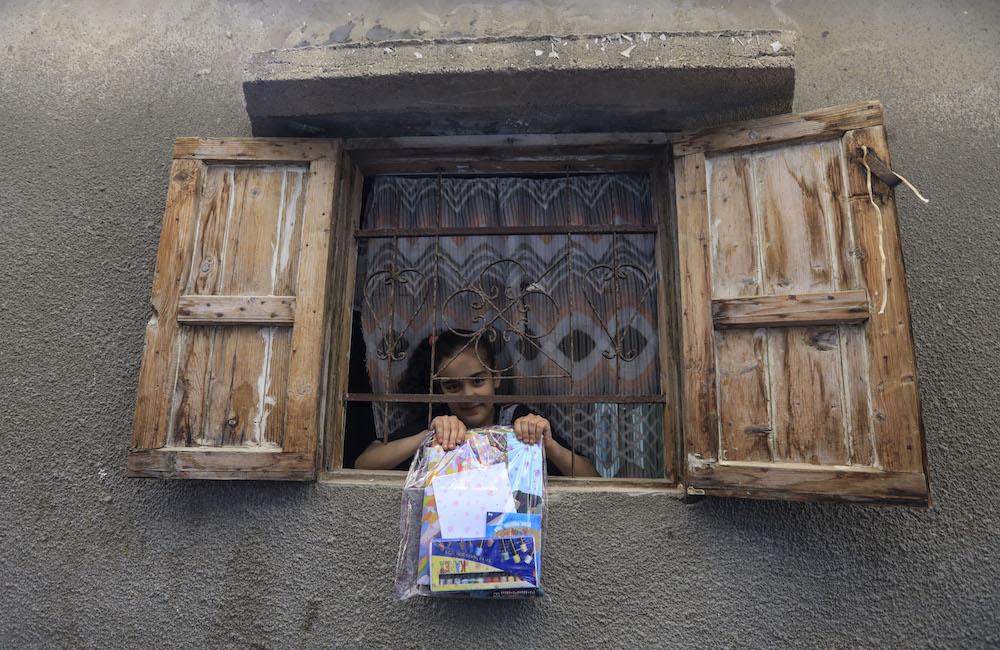
A Palestinian girl displays a package of crafts and reading material distributed by volunteers for the Women's Program Center to children in Deir al-Balah refugee camp in the Gaza Strip. (AFP)
Ridge provided a similar example of how schools can empower children to wake up to their potential.
Alice Springs School of the Air in Australia has been operating for over 60 years to help students who live in some of the world’s most remote areas with no access to schools.
“While there’s a technological component now, that hasn’t always been the case. (The school) uses a lot of physical resources and self-guided materials so students can learn at their own pace,” Ridge said.
“We need to develop more of these kinds of materials for refugee camps so students are able to continue to learn no matter what.”
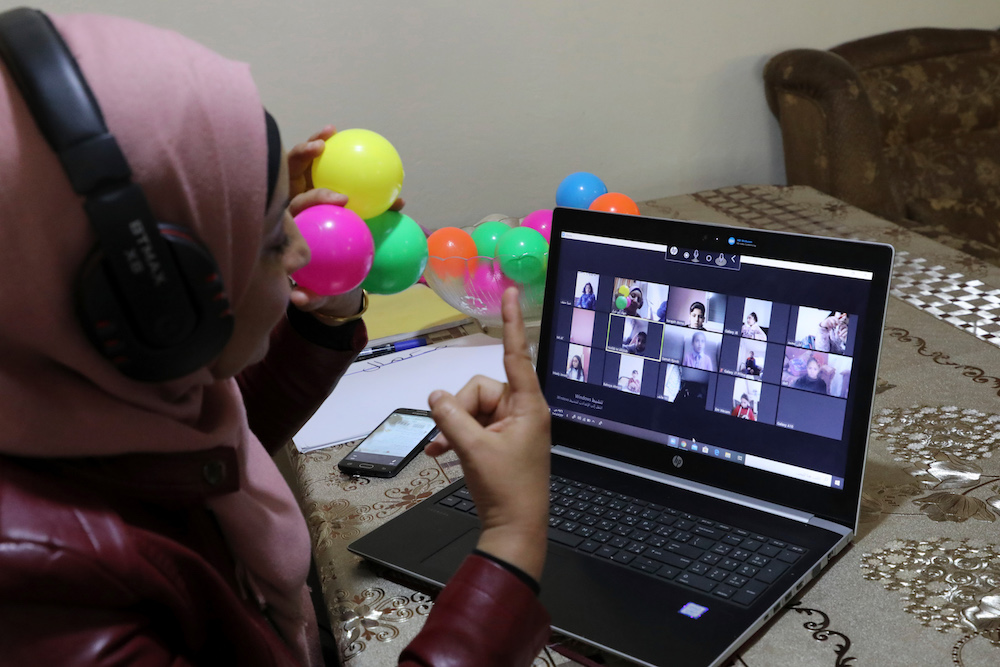
A Palestinian teacher Jihad Abu Sharar presenting an online class from her home in the village of Dura near Hebron in the occupied West Bank, after school closures due to the coronavirus pandemic. (AFP/File Photo)
One of the prominent entities promoting education in the region is the UAE-based Abdulla Al-Ghurair Foundation for Education (AGFE).
Launched in 2015 to support high-quality education opportunities for Emirati and other Arab youth, it is one of the largest privately funded philanthropic organizations in the region.
In response to the pandemic, AGFE last week inaugurated a COVID-19 Online Learning Emergency Fund, as part of its Abdul Aziz Al-Ghurair Refugee Education Fund, to support the educational prospects of refugee children and youth across camps in Jordan and Lebanon, in partnership with the UN High Commissioner for Refugees (UNHCR).
The reality is that, according to UNESCO, the percentage of people with a master’s or equivalent in the Arab world is lower than the global average.
Dr. Sonia Ben Jaafar, CEO of Abdulla Al-Ghurair Foundation for Education
“Online learning has become the new norm to ensure the continuity of education for millions of students across the world, and we know that access to this modality of learning is restricted for too many refugee communities,” said AFGE Chairman Abdul Aziz Al-Ghurair.
“Refugee education has been severely affected by the pandemic, and the aim of launching the fund is to collaborate with grantees and partners to find creative solutions to the pressing needs of refugees and vulnerable students.”
The emergency fund promotes the continuation of existing programs for refugees in Jordan and Lebanon, to counter the impact of precautionary measures meant to stop the spread of coronavirus.
The fund’s objectives focus on the gaps and challenges faced by the most vulnerable refugee youth and host communities in Jordan and Lebanon, which the UNHCR says are among the top 10 countries hosting the largest numbers of refugees globally.
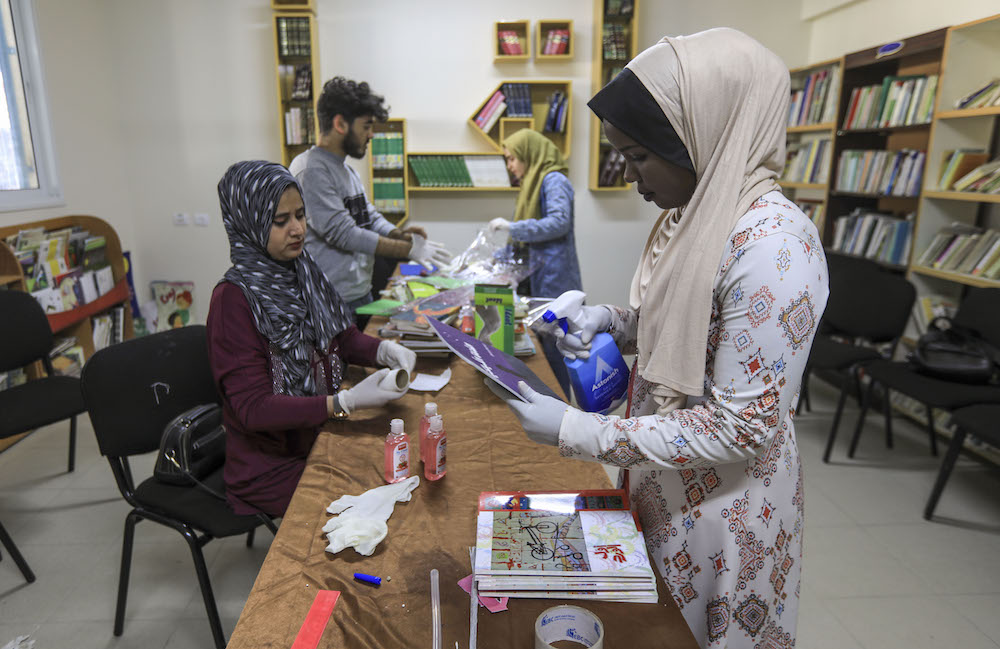
Palestinian activists and volunteers for the Women's Program Center disinfect and prepare crafts and reading material packages to distribute to children in the Deir al-Balah refugee camp in the Gaza Strip. (AFP)
Aiming to reach 6,000 children and youth, the fund focuses specifically on refugees living in overcrowded camps, informal tent settlements and congested host communities, where access to online education is currently out of reach.
It will help organizations address their challenges in transferring their education programs to online modalities or TV. Logistical barriers such as lack of connectivity and technology access will be addressed through the provision of internet connection, laptops and tablets, as well as technical support for digital content.
The fund will also provide access to innovative learning methods, such as high-quality bilingual educational platforms and online tutoring support.
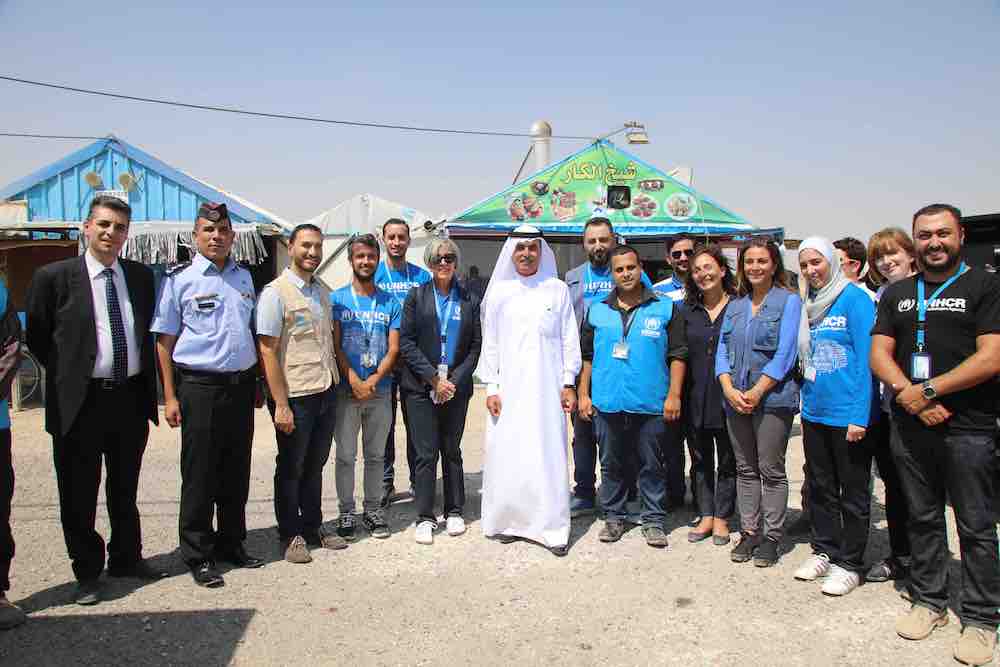
Abdul Aziz Al-Ghurair, chairman of the Abdulla Al Ghurair Foundation (AGFE), during a visit to the Azraq refugee camp in Jordan. (Supplied)
“The world is going through challenging times,” said Khaled Khalifa, senior adviser and Gulf Cooperation Council representative at the UNHCR, which has highlighted the need for more support to refugee education.
“The spread of COVID-19 is disrupting the lives and education of millions of refugees. The partnership between the UNHCR and the fund will help refugees in Jordan and Lebanon, who aren’t equipped with the necessary tools, to join their peers in distance learning without further exposing them to infection.”
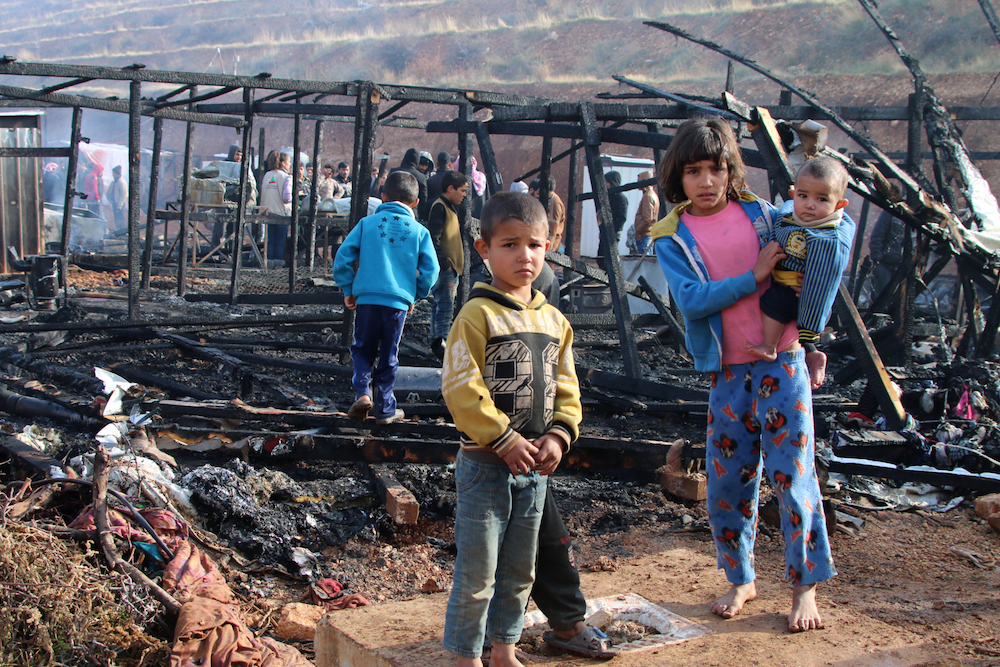
Syrian refugees check the damage following a fire that ripped through their refugee camp in the village of Yammouneh in Lebanon's eastern Bekaa Valley in 2018. (AFP/File Photo)
To date, the fund supports 11 organizations that are collectively reaching over 17,000 refugee and vulnerable youth, and aims to benefit 20,000 refugee youth in Jordan and Lebanon, and conflict-affected children residing in the UAE, by 2022.
Another AGFE program is the Al-Ghurair Open Learning Scholars Program (OLSP), which was designed to provide high-achieving Arab youth from disadvantaged backgrounds with educational opportunities.
“The reality is that according to UNESCO, the percentage of people with a master’s or equivalent in the Arab world is lower than the global average,” AGFE CEO Dr. Sonia Ben Jaafar told Arab News.
“Our OLSP scholars are talented Arab youth who’ll enter post-graduate degree programs at Arizona State University without leaving homes.”
She said AGFE has ensured that students who cannot afford the high fees of elite universities will be able to access elite graduate programs while remaining connected to their communities.
“Online learning is a key solution to help these deserving students enrol in master’s degrees for programs like clinical research management and biomimicry, to become globally competitive specialists,” said Ben Jaafar.
“This is good for them as individuals, but even better for our region since they’ll continue to contribute to the development of their nations.”

















